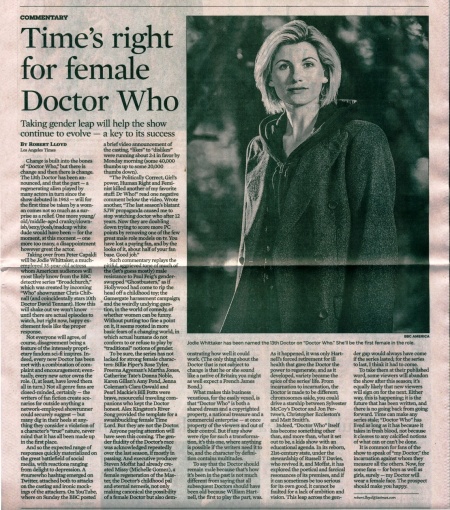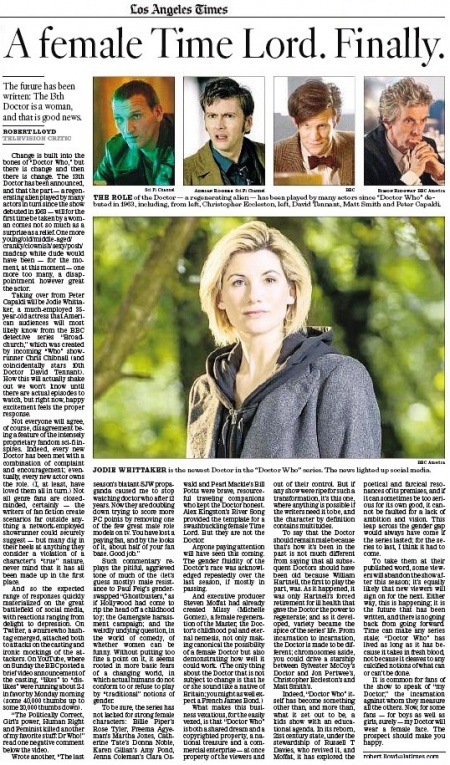Difference between revisions of "A female Time Lord. Finally."
John Lavalie (talk | contribs) (Created page with "right|thumb|450px|Chicago Tribune, July 19, 2018{{article | publication = Los Angeles Times | file = 2017-07-18 Los Angeles Times.jpg |...") |
John Lavalie (talk | contribs) |
||
| Line 11: | Line 11: | ||
| type = | | type = | ||
| description = | | description = | ||
| − | | categories = | + | | categories = cast changes |
| moreTitles = Time's right for female Doctor Who | | moreTitles = Time's right for female Doctor Who | ||
| morePublications = Chicago Tribune | | morePublications = Chicago Tribune | ||
Latest revision as of 05:22, 5 February 2019
- Publication: Los Angeles Times
- Date: 2017-07-18
- Author: Robert Lloyd
- Page: E2
- Language: English
The future has been written: The 13th Doctor is a woman, and that is good news.
JODIE WHITTAKER is the newest Doctor in the "Doctor Who" series. The news lighted up social media.
Change is built into the bones of "Doctor Who," but there is change and then there is change. The 13th Doctor has been announced, and that the part — a regenerating alien played by many actors in turn since the show debuted in 1963 — will for the first time be taken by a woman comes not so much as a surprise as a relief. One more young/old/middle-aged/ cranky/clownish/sexy/posh/ madcap white dude would have been — for the moment, at this moment — one more too many, a disappointment however great the actor.
Taking over from Peter Capaldi will be Jodie Whittaker, a much-employed 35-year-old actress that American audiences will most likely know from the BBC detective series "Broadchurch," which was created by incoming "Who" showrunner Chris Chibnall (and coincidentally stars 10th Doctor David Tennant). How this will actually shake out we won't know until there are actual episodes to watch, but right now, happy excitement feels the proper response.
Not everyone will agree, of course, disagreement being a feature of the intensely proprietary fandom sci-fi inspires. Indeed, every new Doctor has been met with a combination of complaint and encouragement; eventually, every new actor owns the role. (I, at least, have loved them all in turn.) Not all genre fans are closedminded, certainly — the writers of fan fiction create scenarios far outside anything a network-employed showrunner could securely suggest — but many dig in their heels at anything they consider a violation of a character's "true" nature, never mind that it has all been made up in the first place.
And so the expected range of responses quickly materialized on the great battlefield of social media, with reactions ranging from delight to depression. On Twitter, a #nursewho hashtag emerged, attached both to attacks on the casting and ironic mockings of the attackers. On YouTube, where on Sunday the BBC posted a brief video announcement of the casting, "likes" to "dislikes" were running about 2-1 in favor by Monday morning (some 40,000 thumbs up to some 20,000 thumbs down).
"The Politically Correct, Girl's power, Human Right and Feminist killed another of my favorite stuff: Dr Who!" read one negative comment below the video.
Wrote another, "The last season's blatant SJW propaganda caused me to stop watching doctor who after 12 years. Now they are doubling down trying to score more PC points by removing one of the few great male role models on tv. You have lost a paying fan, and by the looks of it, about half of your fan base. Good job."
Such commentary replays the pitiful, aggrieved tone of much of the (let's guess mostly) male resistance to Paul Feig's genderswapped "Ghostbusters," as if Hollywood had come to rip the head off a childhood toy; the Gamergate harassment campaign; and the weirdly undying question, in the world of comedy, of whether women can be funny. Without putting too fine a point on it, it seems rooted in more basic fears of a changing world, in which actual humans do not conform to or refuse to play by "traditional" notions of gender.
To be sure, the series has not lacked for strong female characters: Billie Piper's Rose Tyler, Freema Agyeman's Martha Jones, Catherine Tate's Donna Noble, Karen Gillan's Amy Pond, Jenna Coleman's Clara Oswald and Pearl Mackie's Bill Potts were brave, resourceful traveling companions who kept the Doctor honest. Alex Kingston's River Song provided the template for a swashbuckling female Time Lord. But they are not the Doctor.
Anyone paying attention will have seen this coming. The gender fluidity of the Doctor's race was acknowledged repeatedly over the last season, if mostly in passing.
And executive producer Steven Moffat had already created Missy (Michelle Gomez), a female regeneration of the Master, the Doctor's childhood pal and eternal nemesis, not only making canonical the possibility of a female Doctor but also demonstrating how well it could work. (The only thing about the Doctor that is not subject to change is that he or she sound like a native of Britain; you might as well expect a French James Bond.)
What makes this business vexatious, for the easily vexed, is that "Doctor Who" is both a shared dream and a copyrighted property, a national treasure and a commercial enterprise — at once property of the viewers and out of their control. But if any show were ripe for such a transformation, it's this one, where anything is possible if the writers need it to be, and the character by definition contains multitudes.
To say that the Doctor should remain male because that's how it's been in the past is not much different from saying that all subsequent Doctors should have been old because William Hartnell, the first to play the part, was. As it happened, it was only Hartnell's forced retirement for ill health that gave the Doctor the power to regenerate; and as it developed, variety became the spice of the series' life. From incarnation to incarnation, the Doctor is made to be different; chromosomes aside, you could drive a starship between Sylvester McCoy's Doctor and Jon Pertwee's, Christopher Eccleston's and Matt Smith's.
Indeed, "Doctor Who" itself has become something other than, and more than, what it set out to be, a kids show with an educational agenda. In its reborn, 21st century state, under the stewardship of Russell T Davies, who revived it, and Moffat, it has explored the poetical and farcical resonances of its premises, and if it can sometimes be too serious for its own good, it cannot be faulted for a lack of ambition and vision. This leap across the gender gap would always have come if the series lasted; for the series to last, I think it had to come.
To take them at their published word, some viewers will abandon the show after this season; it's equally likely that new viewers will sign on for the next. Either way, this is happening; it is the future that has been written, and there is no going back from going forward. Time can make any series stale; "Doctor Who" has lived as long as it has because it takes in fresh blood, not because it cleaves to any calcified notions of what can or can't be done.
It is common for fans of the show to speak of "my Doctor," the incarnation against whom they measure all the others. Now, for some fans — for boys as well as girls, surely — my Doctor will wear a female face. The prospect should make you happy.
Disclaimer: These citations are created on-the-fly using primitive parsing techniques. You should double-check all citations. Send feedback to whovian@cuttingsarchive.org
- APA 6th ed.: Lloyd, Robert (2017-07-18). A female Time Lord. Finally.. Los Angeles Times p. E2.
- MLA 7th ed.: Lloyd, Robert. "A female Time Lord. Finally.." Los Angeles Times [add city] 2017-07-18, E2. Print.
- Chicago 15th ed.: Lloyd, Robert. "A female Time Lord. Finally.." Los Angeles Times, edition, sec., 2017-07-18
- Turabian: Lloyd, Robert. "A female Time Lord. Finally.." Los Angeles Times, 2017-07-18, section, E2 edition.
- Wikipedia (this article): <ref>{{cite news| title=A female Time Lord. Finally. | url=http://cuttingsarchive.org/index.php/A_female_Time_Lord._Finally. | work=Los Angeles Times | pages=E2 | date=2017-07-18 | via=Doctor Who Cuttings Archive | accessdate=5 December 2025 }}</ref>
- Wikipedia (this page): <ref>{{cite web | title=A female Time Lord. Finally. | url=http://cuttingsarchive.org/index.php/A_female_Time_Lord._Finally. | work=Doctor Who Cuttings Archive | accessdate=5 December 2025}}</ref>
- Title: Time's right for female Doctor Who
- Publication: Chicago Tribune
- Date: 2017-07-19

